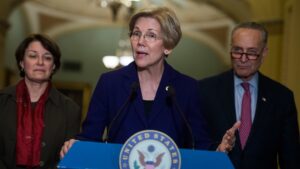The CFPB Showdown: Musk, Warren, and the Future of Financial Oversight
In a dramatic turn of events in the realm of financial regulation, Democratic lawmakers, spearheaded by Massachusetts Senator Elizabeth Warren, have escalated their opposition to the Trump administration’s efforts—and those of tech magnate Elon Musk—to dismantle the Consumer Financial Protection Bureau (CFPB). This event, held on Tuesday, drew attention not just for its political implications but for the broader conversation it has ignited about financial oversight in the digital age.
A Call to Action
The forum featured a lineup of passionate advocates, including a retired military veteran who had benefited from the CFPB’s support, a mortgage broker who praised the bureau for curbing industry malpractice, and the former head of the agency’s supervision division. The spotlight, however, was fixed squarely on Musk, who, according to Warren, is at the forefront of what she dubbed the “Department of Government Efficiency.” Although Musk was invited, he chose not to attend the event.
Senator Warren did not mince words as she addressed the tensions surrounding Musk’s inquiries into the future of the CFPB. "By seizing control of the agency, Musk can root through all of the CFPB’s confidential data," she asserted, referring to Musk’s recent ambitions to introduce a digital payments service via the social media platform X. With oversight from the CFPB looming, Warren suggested that Musk’s maneuvering might not be entirely above board.
A Question of Conflict
Senator Amy Klobuchar chimed in with pointed questions about Musk’s motivations. “Elon,” she asked rhetorically, “how do you justify shutting down the agency that is scrutinizing your peer-to-peer payment plan?” Klobuchar’s inquiries underscore the potential conflicts of interest that arise when influential figures like Musk attempt to reshape regulatory frameworks that directly impact their business aspirations.
The background of these discussions is equally tumultuous, with reports indicating that operatives from Musk’s Department of Government Efficiency accessed CFPB systems recently, right before the agency’s new leadership enacted a sweeping freeze on its activities and laid off a staggering 200 employees. The situation has culminated in legal battles, with a CFPB union alleging that the acting CFPB Director, Russell Vought, plans to terminate over 95% of the bureau’s staff.
The ‘Secret Sauce’ of Financial Data
One notable exchange during the forum involved Lorelei Salas, former CFPB supervision director, who elaborated on the sensitive data housed by the bureau. She emphasized that the CFPB maintained access to critically important trade secrets from major companies in the payments space, such as PayPal, CashApp, and Zelle, including the methodologies behind their credit decision-making processes. “We have information on the secret sauce of the credit models that people use with AI to decide whether you get a loan or not,” Salas revealed, illustrating the high stakes involved in the regulatory landscape.
Furthermore, Salas pointed to the sensitive consumer data collected through complaints, which often include personal identifiers. The question now looms: with the CFPB’s future uncertain, how far will Musk and Vought press their campaign to diminish the watchdog’s influence?
A Regulatory Cliffhanger
As the situation develops, it bears noting that a federal judge has temporarily halted their efforts to terminate employees and purge data, indicating that the conversation about the CFPB is far from over. Warren remained optimistic in her assertion: “The CFPB has been sidelined, but it is not dead. Only Congress has the power to shut down the bureau.” Advocates for financial protection are currently engaged in legal battles, seeking judicial reinforcement of the agency’s authority.
Why This Matters
At the Extreme Investor Network, we believe that the ongoing events surrounding the CFPB have significant implications for investors, consumers, and the future of financial regulation. The rise of digital finance platforms and cryptocurrencies has made consumer protection more critical than ever, and the outcome of this showdown could define the landscape for years to come.
As always, we encourage our readers to stay informed and vigilant. Understanding the interplay between regulation and innovation is not just about protecting one’s interests but also about ensuring a fair and equitable marketplace for everyone.
Stay tuned for more insights from the Extreme Investor Network as we continue to unpack the implications of this evolving story.

